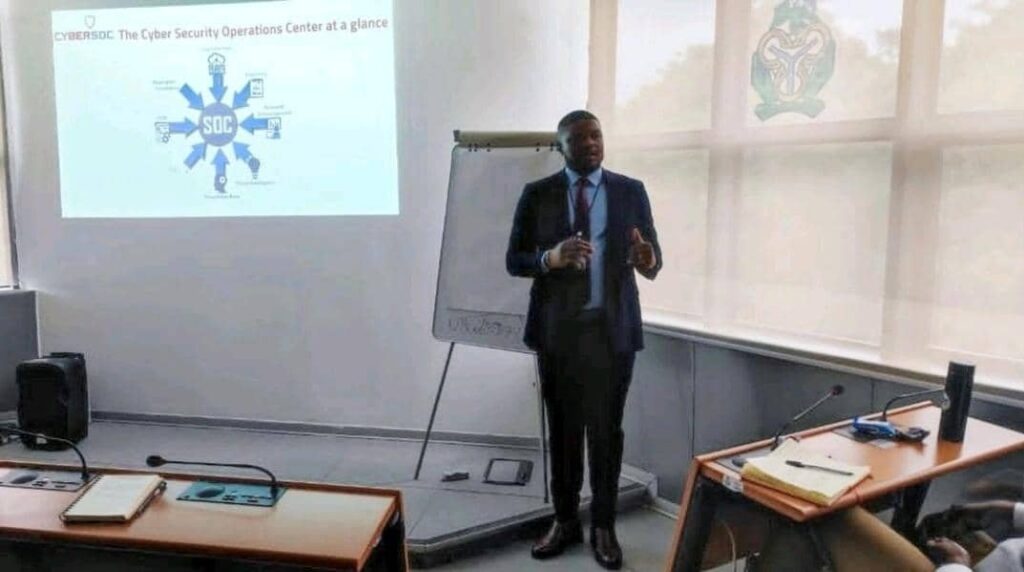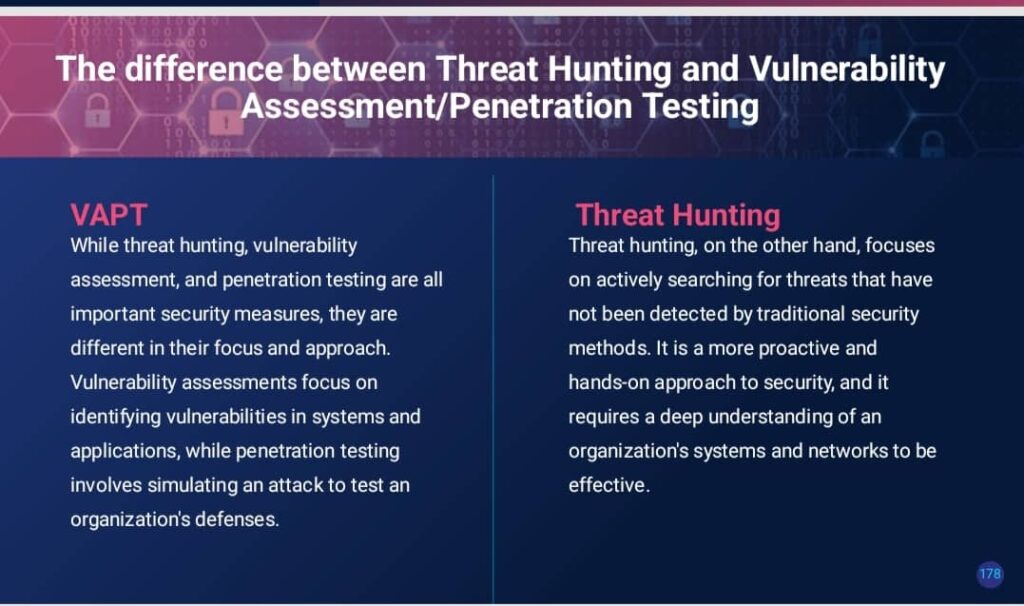The Cybersecurity training, under the title “Cybersecurity Risk and Surveillance,” was conducted from Monday, August 14, 2023, to Friday, August 18, 2023, at the CBN International Training Institute in Abuja. A&D Forensics, being the Cybersecurity Arm and a Sister Company of Convexity Technologies Ltd was charged with the responsibility of training over 20 selected staff from different departments.
What is Cybersecurity?
According to Kapersky, Cybersecurity refers to the practice of protecting computer systems, networks, and sensitive data from unauthorized access, use, disclosure, disruption, modification, or destruction. Hence, it is crucial for banks, financial institutions including the Central Bank of Nigeria (CBN) as they hold sensitive financial data.
Introducing The Cybersecurity Training Module To Participants
Mr.Adedeji Owonibi, our Senior Partner at A&D Forensics, and the Chief Operation Officer at Convexity Technologies Ltd welcomed the participants on the first day. He went ahead to introduce the full insight of topics that were covered throughout the session. The session encompassed the following Modules:
- Introduction to Cybersecurity Risk and Surveillance
- Incident Response Planning and Management
- Cybersecurity Surveillance Tools and Techniques
- Vulnerability Assessment and Penetration Testing + Workshop.
- Cybersecurity Risk Governance and Compliance

Introduction To Cybersecurity Risk and Surveillance
Mr. Abdulafiz Ibrahim CCI, Cybersecurity lead at A&D Forensics, gave an insightful presentation on the topic “Introduction to Cybersecurity Risk and Surveillance.” He explained the Cybersecurity Pillars, commonly referred to as the CIA Triad.
The CIA Triad is a universal model that helps in creating information security policy within an organization. Encryption helps to ensure that even if the data accidentally gets into the wrong hands, the bad actors will have a hard time making use of it.
Cybersecurity risk is defined as the potential negative consequences that may arise due to unauthorized access, disclosure, disruption, modification or destruction of information or information systems. To manage cybersecurity risk, there’s a need to continuously identify the risk, assess the risk and treat the risk. Hence, the best way to treat cybersecurity risk is to avoid the risk if possible.
The Day 1 of the Cybersecurity training also explored emerging threats, using a ChatGPT scenario to highlight real-world implications. At the end of the first day, participants acquired a comprehensive overview of cybersecurity and an understanding of the imperative nature of cybersecurity risk management within the banking sector.

During the Cybersecurity Training, A&D Forensics implemented a Gamified Learning Approach.
The second day of the Cybersecurity Training at the CBN Training Institute commenced with a succinct review of the previous day’s proceedings. This recapitulation was skillfully facilitated in a gamified way by Chioma Onyekelu, CCI, our dedicated Forensic Specialist.
Following this, the focus shifted to Mr. Abdulhafiz Ibrahim, CCI, our Cybersecurity Lead, who provided participants with a thorough training session on the topic of “Incident Response Planning and Management.” This segment of the training allowed attendees to immerse themselves in a comprehensive study of the significance of planning and managing incidents within the realm of cybersecurity.
Cybersecurity Training on Incident Response Planning and Management
What is an Incident Response Plan?
An Incident Response plan is a document that outlines the procedures an organization will follow in the event of a cybersecurity incident. It provides guidance on how to detect, contain and recover from a security breach. A good incident response and management will help minimize the impact of the damage, reduce recovery time, improve incident detection, ensure business continuity and protects the organization’s reputation.

At the end of this Cybersecurity Training Module, participants had developed a profound appreciation for the critical role of incident response planning and management in the cybersecurity domain. They were equipped with the skills to construct their own incident response plans and were familiarized with best practices for formulating effective incident response strategies through the utilization of Tabletop Exercises.
Cybersecurity Surveillance Tools and Techniques
The third day of the Cybersecurity Training was led by Mr. Jude Ozinegbe, our CyberSecurity Specialist, who is also the convener of Cyberchain in Nigeria. He led an illuminating session on “Cyber Security Surveillance Tools and Techniques.”

Cybersecurity surveillance involves monitoring and analyzing computer networks, systems and applications to detect and respond to cybersecurity threats in real time. By utilizing this proactive approach, organizations can identify potential threats and take necessary actions to prevent them from becoming major incidents that can result in data breaches, financial losses or reputational damage.
A more proactive measure in cybersecurity surveillance is to establish a Security Operation Center (SOC). Following this, Mr. Ebenezar – who worked with the largest Security Operation Centre in NIgeria and operators of the CBN SOC guided participants through a practical pivotal role of Security Operations Centers (SOC) in cybersecurity risk management. He shed light on best practices that could distinguish participants in this field.

Our Cybersecurity Training Participants delved further into the intricacies of Threat-Hunting, explored its various techniques, tools, and its pivotal role in cybersecurity risk management. Furthermore, participants were privileged to witness a real-life scenario demonstrated through practical utilization of an actual tool threat hunting tool.
At A&D Forensics Training Institute, we believe in learning through real-time scenarios and interractive demos. Our aim is to equip our learners with the skills they need to tackle daily challenges confidently upon completing our courses.
A&D Forensics
Vulnerability Assessment and Penetration Testing
A Vulnerability Assessment is a process of identifying and quantifying security vulnerabilities in an organization’s systems, applications and network infrastructure. While, penetration testing (pen testing) is a process of testing an organization’s defences against a simulated cyber attack.
What is the difference between Threat Hunting and Vulnerability Assessment/Penetration Testing in Cybersecurity?
Vulnerability Assessment focuses on identifying vulnerabilities in systems and applications, while penetration testing involves simulating an attack to test an organization’s defenses.
However, Threat hunting focuses on actively searching for threats that have been detected by traditional security methods.

The Cybersecurity Training participants carried out a workshop that demonstrated a phishing email in action, enhancing their understanding of real-world threats. They were also equipped with the essential skills to perform impactful vulnerability assessments and penetration tests within robust cybersecurity strategies.
Cybersecurity Training on Risk Governance and Compliance
Cybersecurity risk Governance refers to the set of policies, procedures and controls that organizations put in place to manage their cybersecurity risks effectively. It provides a framework for managing risks that includes establishing governance structures, defining roles and responsibilities in implementing policies and procedures that support cybersecurity risk management.
Cybersecurity Compliance refers to the ability of an organization to meet the regulatory and legal requirements related to cybersecurity. It includes meeting the requirements of industry-specific regulations, such as the Payment Card Industry Data Security Standard (PCI-DSS) as well as General Data Protection Laws such as the NDPR in Nigeria.
This cybersecurity training session presented an interactive exploration of informative learning and engrossing discussions, featuring real-time case studies from participants’ experiences. Participants gained insights into regulatory requirements and international standards for cybersecurity risk governance.
Award Ceremony At the Conclusion of the Cybersecurity Training
At the completion of the cyber security training, each participant was honored with the certificate of accomplishment from the CBN International training institute .

In addition, A&D Forensics and Convexity Technologies rewarded the best participants from the daily quiz in recognition of their dedicated efforts.


About A&D Forensics Training Institute
A&D Forensics is Africa’s Leading Blockchain Intelligence Service Provider. We offer Professional and Certification Trainings for Individuals and Corporate Bodies through our training arm, A&D Forensics, Institute.
At A&D Forensics Training Institute, we take pride in training financial institutions and corporate bodies on cybersecurity, cryptocurrency compliance and cryptocurrency investigations
A&D Forensics is your dependable partner for bespoke corporate cybersecurity, crypto compliance and investigation training. Don’t hesitate to reach out to us here. We are eager to support your organization.






